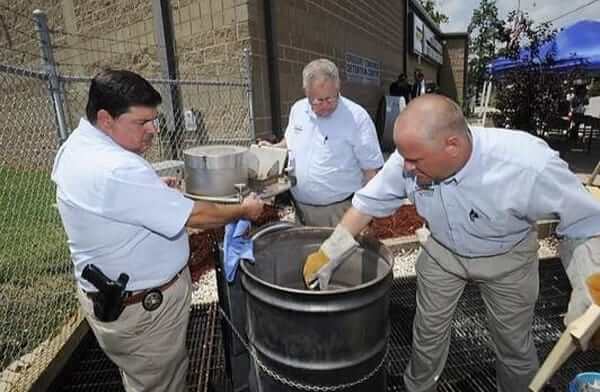
MOUNTAIN HOME – Incinerating old or unneeded medicines helps counter teenage drug abuse and stems the flow of pharmaceuticals into rivers, lakes and streams, according to a partnership of law enforcement officers, health-care workers, businessmen and environmentalists.
The Baxter County sheriff’s office has joined a growing number of police agencies nationwide in acquiring a “Drug Terminator” incinerator. The portable incinerator is designed to burn illegal drugs, unneeded prescriptions and over-the-counter medications, turning them into harmless ash.
The sheriff’s office, pharmacists, educators, public health officials, a hospital and others are working together to sponsor a drug “take-back” day Saturday.
During “Operation Drop Off,” anyone can drive through the Baxter County Fairgrounds and hand over old prescriptions and overthe-counter drugs to deputies for incineration.
Officers will also collect illegal and unregulated drugs during Operation Drop Off. “No questions asked,” Baxter County Sheriff John Montgomery said.
Police departments elsewhere in Arkansas, including Benton in Saline County and Bella Vista in Benton County, have sponsored similar takeback programs. The federal Drug Enforcement Administration, working with state and local law-enforcement agencies nationwide, will hold a national drug takeback day Sept. 25.
Roller Funeral Homes of Arkansas donated $4,250 to purchase the Baxter County incinerator. “Basically, if you can light a fire, you can use one of these units,” said Jeremy Pretzsch, incinerator sales manager for Elastec/American Marine Inc. in Carmi, Ill.
Pretzsch said the “Drug Terminator” was designed specifically for law-enforcement officers for safe disposal of illegal drugs. There are about 300 units in use around the country, he added. The device can be fueled by wood or charcoal and can burn about 50 pounds of material per hour.
Disposing of confiscated drugs has been a perennial problem for police, Montgomery said. But the storage and disposal of legal medications in American homes has far-reaching effects on society, he said.
The family medicine cabinet is often the first stop for teenagers seeking prescription pain relievers for recreational use, police and health professionals said.
“According to studies, most teens and young people get the drugs that they abuse from a family member just by looking in the medicine cabinet,” said pharmacist Leo Zibert, a program partner and the owner of Medi Sav Pharmacy in Mountain Home.
Pharmaceuticals also are turning up in the nation’s waterways, said Jane Darr, president of the Friends of the North Fork and White Rivers. The nonprofit watershed protection organization is another Operation Drop Off partner.
For years, people flushed old medications down toilets or poured them down drains. Both disposalmethods were cheap and seemed to be the simplest way to prevent unintended use, Darr said.
But wastewater plants and septic systems generally aren’t designed to treat pharmaceutical waste,she said, adding that human medications have been found in waterways in 30 states.
Concern for waterways helped inspire the Bella Vista Police Department to purchase a “Drug Terminator” several years ago, Police Chief Ken Farmer said.
An area resident who wanted to remain anonymous bought the incinerator for the police department. A Benton County group then helped the department erect a secure drug drop-off box in front of the police station, where residents can drop off unneeded medications.
“The public’s response has been outstanding,” Farmer said. “We are incinerating meds twice a month.” The police department also collects medications during Benton County’s twice-monthly free “community shredder days,” when residents can bring old documents for shredding.
Between the drop box and the county program, Bella Vista police collect and destroy an average of 100 pounds of pharmaceuticals a month, Farmer said.
A wastewater official in Bentonville said she advises people to take their old medicines to the Bella Vista police drop box for safe disposal.
Nancy Busen, wastewater lab and pretreatment supervisor for Bentonville, said studies by the U.S. Geological Survey have found pharmaceuticals in waterways downstream from watertreatment plants, including in northwest Arkansas.
She said studies have also shown that fish “were different downstream [from the plants] than they were upstream,” including findings of feminization of male fish “in alarming numbers.” “For many years people were told to flush it down the toilet. We need to revise that,” Busen said.
Busen will be one of the speakers at a one-day workshop for Arkansas teachers on July 29 in Fayetteville. The “Project WET” workshop will focus on pharmaceuticals’ impact on water quality, as well as drug takeback programs.
For more information about the ELASTEC Drug Terminator, contact Jeremy Pretzsch, Elastec/American Marine Sales Manager.

